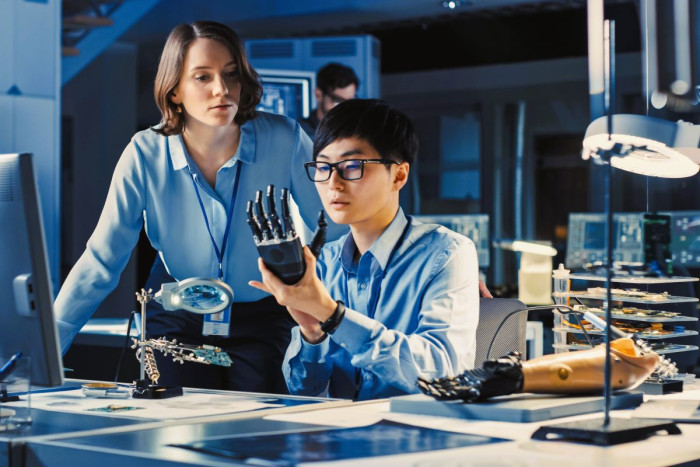Biomedical Engineer
Mataaro Rongoā Koiora
Alternative titles for this job
Biomedical engineers design, build and maintain medical equipment, artificial body parts and computer programs to help treat disabilities, diseases, or injuries.
Pay
Graduate biomedical engineers usually earn
$50K-$55K per year
Experienced biomedical engineers can earn
$110K-$130K per year
Source: FutuureinTech and PERSOLKELLY,; 2023
Job opportunities
Pay
Pay for biomedical engineers depends on their qualifications and experience.
- Graduate biomedical engineers usually earn $50,000 to $55,000 a year.
- Experienced biomedical engineers can earn $110,000 to $130,000 a year.
Source: FutuureinTech, 2023; and PERSOLKELLY, '2023 - 2024 Salary Guide', 2023
PAYE.net.nz website - use this calculator to convert pay and salary information
(This information is a guide only. Find out more about the sources of our pay information)
What you will do
Biomedical engineers may do some or all of the following:
- consult and collaborate with doctors and other medical staff
- conduct research and publish the results
- keep up to date with biotechnical developments
- design and develop products such as medical scanning devices, machines, artificial body parts and software
- repair medical equipment
- test products with patients or volunteers
- train medical staff in how to use devices, and provide technical support when devices are in use.
Skills and knowledge
Biomedical engineers need to have:
- knowledge of engineering and biology
- design skills
- skill in computer modelling and software design
- skill in interpreting design specifications
- knowledge of anatomy and physiology (the science of how the body functions), and medical terms.
Working conditions
Biomedical engineers:
- usually work normal business hours, but may work long hours on projects or after hours if they work for a hospital
- work in offices, factories, research institutes, hospitals and rehabilitation units
- may travel overseas for research and conferences.
Entry requirements
To become a biomedical engineer you need to have one of the following:
- Bachelor of Engineering (Biomedical Engineering) (Honours)
- Bachelor of Engineering (Honours) in a relevant discipline such as electronic engineering or mechanical engineering and applied science subjects.
To work in research you usually need a Doctorate in Engineering.
Secondary education
A tertiary entrance qualification is required to enter further training. Useful subjects include biology, chemistry, design and visual communication, digital technologies, mathematics and physics.
Personal requirements
Biomedical engineers need to be:
- practical and logical
- accurate, with an eye for detail
- creative and innovative
- able to work well under pressure
- problem-solvers
- able to work alone or as part of a team.
Useful experience
Useful experience for biomedical engineers includes:
- engineering work
- work with computers and electronics
- experience in the health care industry.
Physical requirements
Biomedical engineers working with electronics need to have normal colour vision so they can distinguish between different coloured electrical cables.
Find out more about training
- Engineering New Zealand
- 64 4 473 9444 - hello@engineeringnz.org - www.engineeringnz.org
What are the chances of getting a job?
The number of biomedical engineers has been rising in recent years. However, more are needed to meet demand caused by:
- experienced staff often leaving for better paid positions overseas
- an ageing population with more health problems
- increasing use of sophisticated medical devices in the health industry.
According to the Census, 216 biomedical engineers worked in New Zealand in 2018.
Types of employers varied
Biomedical engineers work for a range of employers, including:
- research institutes at universities
- public hospitals
- veterinary clinics and research institutes
- private businesses that provide biomedical products.
Some biomedical engineers also work in film animation, where their knowledge of body movement is useful.
Sources
- Auckland Bioengineering Institute website, accessed June 2017, (www.abi.auckland.ac.nz).
- Canterbury District Health Board Careers website, accessed June 2017, (www.cdhbcareers.co.nz).
- Counties Manukau Health, '2015 Health Workforce Report', accessed June 2017, (www.countiesmanukau.health.nz).
- Engineering Education to Employment, 'Our Shortfall in ITP-Educated Engineers', June 2017, (engineeringe2e.org.nz).
- Futureintech website, accessed June 2017, (www.futureintech.org.nz).
- IPENZ Engineers New Zealand, 'Demand Drives Surging Salaries for Engineers', accessed June 2017, (www.ipenz.nz).
- Ministry of Business, Innovation and Employment, 'Occupation Outlook Engineering Professionals', accessed June 2017, (www.mbie.govt.nz).
- Stats NZ, '2018 Census Data', 2019.
- University of Canterbury Centre for Bioengineering website, accessed June 2017, (www.bioengineering.canterbury.ac.nz).
(This information is a guide only. Find out more about the sources of our job opportunities information)
Progression and specialisations
Biomedical engineers may move into managerial roles. Those who work in universities may become tertiary lecturers, assistant professors, or professors.
Biomedical engineers may specialise in areas such as:
- biotechnology – developing commercial products using living material. For example, designing organisms to produce antibiotics
- instrumentation – development of new instruments, such as heart monitoring systems, for diagnosis, treatment or measurement of body processes
- medical software development
- nanotechnology – research and development of tiny products, such as microscopic sensors, that can measure changes in body tissue
- prosthetic and implant development – artificial replacements for body parts including limbs and internal organs
- systems monitoring – monitoring and testing of health care systems
- tissue engineering – repairing or making artificial replacements for tissues such as blood vessels and skin.
Last updated 11 December 2023


